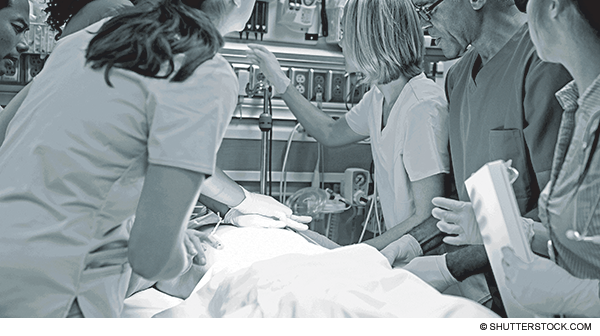
Dr. Marco is professor of emergency medicine at Wright State University Boonshoft School of Medicine in Dayton, Ohio. She currently serves on the ACEP Ethics Committee. Dr. Baker works clinically for Riverwood Emergency Services Inc. She is assistant professor of emergency medicine at the University of Toledo College of Medicine and Life Sciences. She currently serves on the ACEP Ethics Committee.
Explore This Issue
ACEP Now: Vol 33 – No 05 – May 2014Dr. Jesus is assistant professor of emergency medicine at Christiana Care Health System in Newark, Del. He currently serves on the ACEP Ethics Committee.
Dr. Geiderman is a professor of emergency medicine and emergency department co-chairman at Cedars-Sinai in Los Angeles. He currently serves as chair of the ACEP Ethics Committee.
References
- Kaldjian LC, Erekson ZD, Haberle TH, et al. Code status discussions and goals of care among hospitalised adults. J Med Ethics. 2009;35:338-342.
- Shalowitz DI, Garrett-Mayer E, Wendler D. The accuracy of surrogate decision makers: a systematic review. Arch Intern Med. 2006;166:493-497.
- Suhl J, Simons P, Reedy T, et al. Myth of substituted judgment. Surrogate decision making regarding life support is unreliable. Arch Intern Med. 1994;154:90-96.
- Perkins HS. Controlling death: the false promise of advance directives. Ann Intern Med. 2007;147:51-57.
- Hamel MB, Lynn J, Teno JM, et al. Age-related differences in care preferences, treatment decisions, and clinical outcomes of seriously ill hospitalized adults: lessons from SUPPORT. J Am Geriatr Soc. 2000;48:S76-S82.
- Marco CA, Schears RM. Societal preferences regarding cardiopulmonary resuscitation. Am J Emerg Med. 2002;20:207-211.
Pages: 1 2 | Single Page




One Response to “How to Approach End-of-Life Care Discussions, Determine Treatment Goals for Patients Near Death in the Emergency Department”
May 10, 2014
Chuck Pilcher MD FACEPThe conversation changes completely if one uses “Allow Natural Death” in the family discussion, instead of the clinical terms “No CPR,” “Do Not Resuscitate,” “No Code,” etc.
I have had patients and families respond as if all the weight in the world was lifted from their shoulders when I have asked “If while you are here in the hospital your heart or breathing stops AND YOU DIE A NATURAL DEATH, do you want us to do anything about that?”
The usual response, no matter what their Advance Directive may say is, “Oh, no. I’ve always wanted to die a natural death, not hooked up to any tubes or machines.”
There’s a wealth of resources on this available. Just search “Allow Natural Death.”